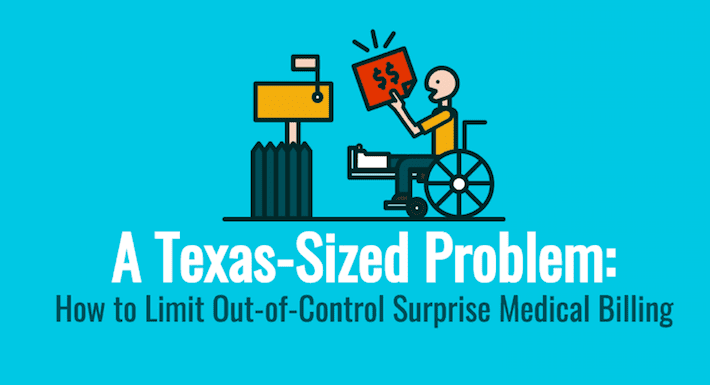It’s been 10 years since the Texas Legislature passed the nation’s first system to let consumers challenge surprise medical bills! In 2009, HB 2256 by Sen. Kelly Hancock set up Texas’ surprise medical bill mediation system.
Surprise medical bills happen when insurers and doctors or other health care providers – fighting over prices – jointly pass the buck to a patient, who received out-of-network health care unknowingly.

CPPP has worked on protecting consumers from surprise medical bills throughout the last 10 years. Much has changed since Texas set up its mediation system. Here are my highlights:
- The Texas Legislature has expanded and improved the surprise billing mediation system twice, with SB 481 in 2015 and SB 507 in 2017, both sponsored by Sen. Hancock. Since 2009, about 13,000 Texans have requested mediation, and it has saved Texans at least $30 million.
- Consumer outcry over surprise medical bills has only grown. Here are some recent out-of-network medical billing stories from Texas: a lab billed a Texan $17,000 to test a urine sample; an $8,000 bill from an emergency even after the patient checked that the emergency room was in-network; a $109,000 bill following a heart attack; and a $56,000 air ambulance ride.
Recent polling by the Kaiser Family Foundation shows that surprise medical bills are a major concern for Americans. Two-in-three Americans are worried about affording surprise medical bills, putting that concern above other high-cost items like health insurance deductibles, prescription drug costs, health insurance premiums, gasoline, and housing.
- We know more about the scope of the problem. CPPP released a ground-breaking report in
2014, and updated it in 2017, showing that Texans frequently get care at in-network hospitals but are nonetheless at risk of surprise, out-of-network medical bills.
We now also know the problem is worse in Texas. Research shows that, nationally, 20 percent of patients admitted to the hospital through the emergency room
- It’s become clear over time that Texas’ first-in-the-nation mediation system for surprise bills won’t help most consumers who need it. Over a two-year period, about 250,000 Texas patients will get a surprise medical bill that could technically go to mediation. However, only 4,500 patients were able to access mediation in 2018, and the Texas Department of Insurance expects only 8,000 to file for mediation this year.

The mediation system places a huge burden on patients to navigate the broken medical billing system, and that complexity effectively prevents most patients from getting needed help.
The CBS Evening News featured CPPP and the Texas mediation system on its national broadcast this week.

- Other states have figured this out, and Congress may act. Nine states have now enacted comprehensive protections for consumers, paving a path for other states like Texas. Also, recently, the U.S. Senate has taken some steps on a bipartisan approach at the federal level, and President Trump has expressed support for ending surprise medical bills. Surprise billing protections in state law can only reach the 1-in-3 Texans with private health insurance in state regulated plans. To protect all Texas patients, Congress will also need to act.
- More and more stakeholders are supporting a fix to the problem that fully protects consumers. Consumer and patient groups in Texas have long called for two key protections: (1) patients should only be billed for their in-network deductible or copay when they unknowingly and unavoidably get care out of network, and (2) patients shouldn’t be trapped in the tug-of-war between health care providers and insurance companies over out-of-network prices.
Now lots of other the groups at the table have joined the chorus calling for these consumer protections. Texas business groups and health plans joined consumer groups in calling for patient protections. Also, national physician groups along with most state medical societies called for protecting consumers in their approach to address surprise medical bills, as have national hospital associations.
Momentum to meaningfully address surprise medical bills for patients is clearly growing. In fact, Chairman Hancock has pledged to file a bill in 2019 that protects patients by removing them from out-of-network billing fight. Maybe 2019 will be the year for strong state and federal fixes that end surprise medical billing.
